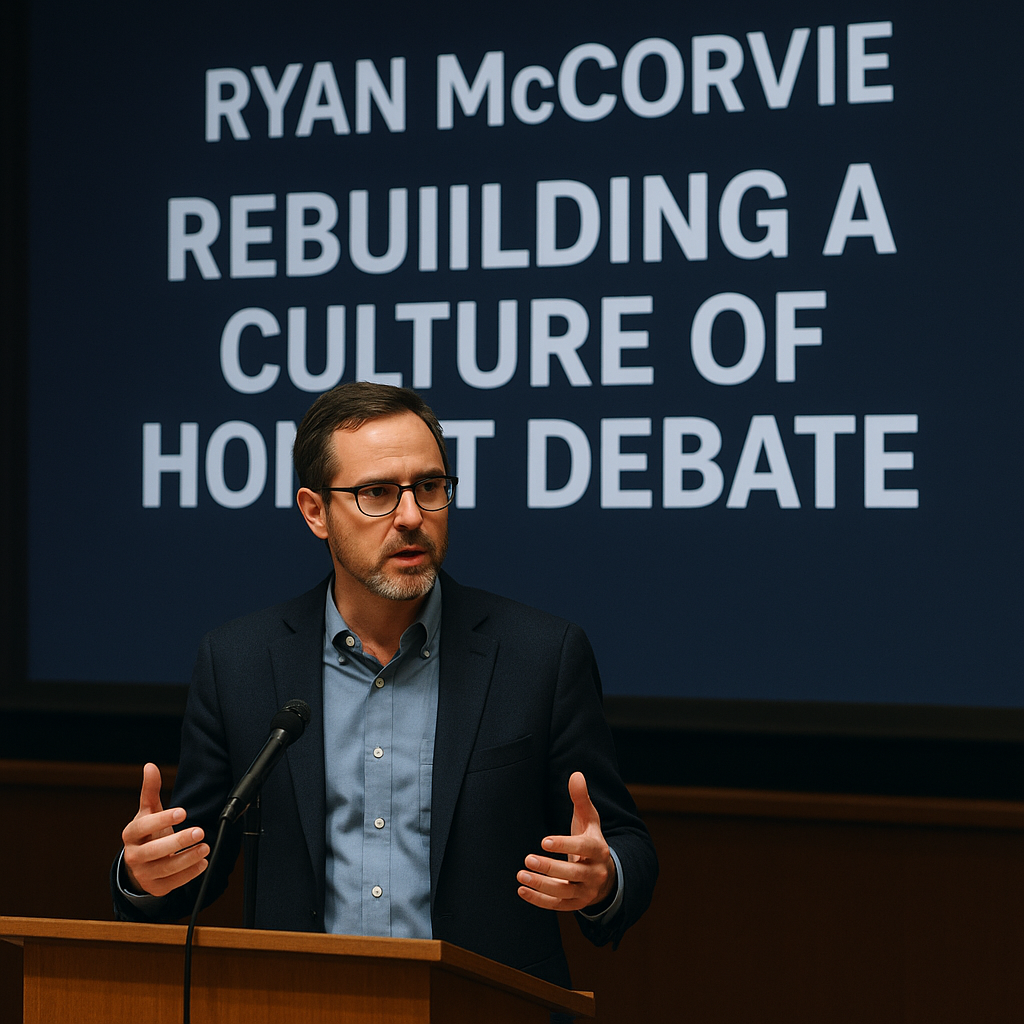We live surrounded by voices, yet so few of them seem to reach us. Arguments spill across screens, but most feel more like performances than conversations. People talk at each other, not with each other, and the volume keeps rising. In that endless hum, genuine listening feels rare. It’s not that we’ve forgotten how to speak—it’s that we’ve forgotten how to pause.
Berkeley-based entrepreneur Ryan McCorvie emphasizes that open debate still matters, especially on campuses where the instinct is often to shut down disagreement rather than engage it. His voice reminds us that disagreement, handled carefully, can sharpen thought instead of shutting it down.
Belonging has a powerful pull. When everyone around us appears to share the same view, disagreement feels risky. It becomes easier to avoid discomfort than to challenge the room. That instinct has reshaped how we discuss almost everything. Instead of curiosity, we seek reassurance. Instead of dialogue, we build walls.
“Somewhere along the way, debate started to feel like combat,” says McCorvie. “Winning became the goal, not understanding.” The impulse to defend replaced the willingness to learn. Listening takes time, and time feels expensive. Yet without it, conversation becomes an echo, bouncing endlessly within our own beliefs.
Table of Contents
How We Built Our Own Echo Chambers
Echo chambers don’t appear overnight. They grow through tiny, comfortable choices—muting a friend, skipping a conversation, curating a feed until nothing surprises us. Each decision feels harmless, even sensible. Then one day, disagreement feels foreign.
Comfort has a cost though. When our ideas are never tested, they harden into identity. Agreement feels like validation, and validation starts to look like truth. Over time, challenge feels threatening instead of enlightening. Debate fades, not because anyone forbids it, but because it makes us uneasy.
Isolation dulls empathy. When we stop hearing other perspectives, we stop imagining how others think. Research from the Pew Research Center found that about one in five Americans now hold ideologically consistent views across a range of issues—double the share from two decades ago. The more consistent our views become, the easier it is to dismiss those who differ from us. By choosing comfort, we lose connection.
When Debate Became a Performance
Public debate once carried a sense of exchange—an openness to being moved or proven wrong. That spirit has been replaced by a kind of theater. Each statement feels rehearsed for an audience rather than directed at another person. Every response is shaped for effect, not understanding.
Performative debate thrives on spectacle. Loud certainty travels farther than thoughtful restraint. Subtlety rarely earns attention, and humility doesn’t fit into short clips or headlines. Real thinking requires pauses, hesitations, and the willingness to say, “I don’t know.” Those moments of honesty don’t perform well, so they disappear.
Researchers have found that users are up to four times more likely to engage with content they disagree with than with content they support, according to PsyPost. That dynamic rewards outrage over reflection. The louder the performance, the more attention it earns, leaving truth to compete against emotion—and often lose.
Ryan McCorvie: Empathy, the Step We Keep Skipping
Empathy has been treated like an accessory—nice to have, but optional. In truth, it’s the foundation of any real debate. Understanding another point of view doesn’t mean surrendering your own. It means acknowledging that every opinion comes from a place, even if you don’t share it.
“Too often, empathy is mistaken for weakness,” says McCorvie. “Yet it takes more strength to listen with an open mind than to react in anger.”
Empathy asks for patience, and patience rarely feels rewarding in fast exchanges. But it’s the only force that turns arguments into insight. A long-term study cited by the American Alliance of Museums found that empathy among college students has fallen by nearly 48 percent over four decades, showing how emotional understanding has become harder to sustain in modern culture.
When empathy is absent, trust dissolves. People stop expecting good faith from one another. A simple question can sound like an attack. The result isn’t just hostility—it’s exhaustion. To restore real discussion, empathy has to move from sentiment to habit: an active choice to see another person, not just their position.
What Honest Debate Actually Looks Like
Honest debate is not tidy. It’s uneven, emotional, and often uncomfortable. It involves speaking from conviction while staying open to correction. The best exchanges end not in victory, but in mutual clarity. Understanding replaces agreement as the goal.
Healthy debate depends on how we handle tension. Disagreement should stretch our understanding, not our patience. That happens only when people feel safe enough to admit uncertainty. Changing your mind isn’t a failure—it’s evidence of growth. When that becomes normal, conversation regains its purpose.
Rebuilding that culture means rewarding thoughtfulness over speed. Ask before assuming. Pause before replying. Make room for silence. Those habits may feel small, but they turn argument into dialogue. Real debate is less about volume and more about the willingness to stay in the discussion after it gets difficult.
Listening as an Act of Defiance
Listening looks simple, but in a world built on reaction, it’s a form of resistance. Choosing to hear someone out (without rushing to respond) cuts against the expectation that every disagreement must be won. It’s a reminder that understanding is still possible.
“The revival of honest debate doesn’t start with institutions or policies,” says McCorvie. “It begins in small, private choices: staying in a tense conversation, asking a follow-up question, resisting the urge to dismiss. Those gestures rebuild the fragile thread of trust that real discussion needs.”
Empathy and argument aren’t enemies. One keeps debate human; the other keeps it honest. If we can learn to hold both, maybe we’ll begin to replace noise with connection—not because we all agree, but because we remember how to listen.
